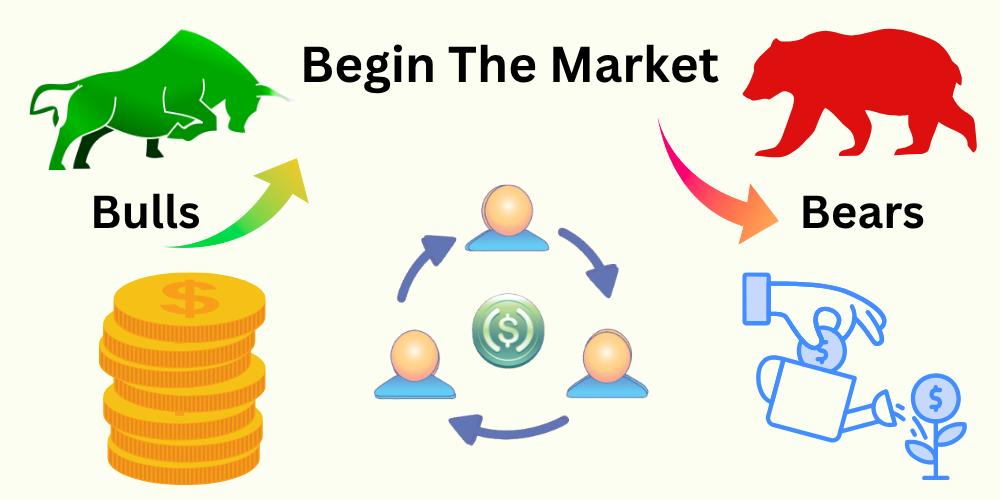Behind every rich person is a smart investment — and many of those investments start in the stock market.
Have you ever asked yourself what the stock market really is and how it works? For most beginners, the words “shares” and “stock market” sound difficult and risky. But in reality, it is much easier to understand than you might think. And once you learn it, the stock market can open the door to great money-making opportunities.
Contents
In this guide, we will explain what the stock market is, the key things to keep in mind, and the basics you must know to take your first confident steps into the world of investing.
Are you ready? Let’s get started!
📈What Is a Stock/Share Market?
The stock market (also called the share market) is a platform where investors buy and sell shares of publicly listed companies. When you buy shares of a company, you become a partial owner. If the company performs well, the value of your shares may increase. In many countries, the terms “stocks” and “shares” are used interchangeably. “Stock” generally refers to ownership in one or more companies, while “share” refers to ownership in a specific company.
🏢Why Do Companies Sell Shares?
Raising capital🔼
Companies sell shares to raise capital for growth, expansion, and operations. They can do this by offering shares to the public or seeking institutional funding.
- Funding: Companies need additional funds to expand their operations, open new branches, or enter new markets.
- Paying off debt: If a company has accumulated debt, selling shares can help raise enough money to ease financial pressure and pay it off.
- Investing in research and development: Companies need to innovate to remain competitive, so they require funds for R&D activities.
- Improving working capital: Companies can also sell shares to improve liquidity and maintain smooth daily operations without relying too heavily on debt.
Initial Public Offering (IPO)🚀
An Initial Public Offering (IPO) is the process by which a private company offers its shares to the public for the first time. Here are some reasons why companies go public.

- Access to public markets: Going public allows companies to raise capital by selling shares to a wide base of investors, including individuals and institutional investors.
- Increased brand visibility and credibility: An IPO can raise a company’s profile, attracting the attention of customers, suppliers, and potential employees. Being publicly traded often conveys a sense of credibility and stability.
- Providing liquidity for existing investors: Existing private investors (such as founders, employees, or venture capitalists) can sell some of their shares during an IPO, allowing them to realize returns on their investments.
- Attracting and retaining talent: Publicly traded companies can offer employees stock options as part of their compensation packages, making it an attractive incentive.
In summary, companies sell shares to raise the capital needed for growth, expansion, and other strategic initiatives, with an IPO serving as a significant step in making a company’s shares available to the public.
⚙️ How Does the Stock Market Work?
The stock market is a platform where shares of publicly listed companies are bought and sold. It connects buyers and sellers and ensures that transactions are conducted fairly and transparently.
Basic Mechanism🔄
- Companies list their shares on a stock exchange (such as the NSE, BSE, Nasdaq, S&P 500, or Dow Jones) through an IPO.
- After listing, investors can buy and sell these shares on the exchange.
- When you buy any stock, you become a shareholder in the company, regardless of its size.
- All transactions are recorded electronically, and prices are determined by ongoing demand.
- Stock exchanges act as regulated markets to ensure smooth, safe, and fair trading.
- Investors make a profit through a combination of capital gains when the value of their investments increases and dividends, which are regular payments made by some companies to shareholders.
Market Forces🌊
- The prices of shares in the stock market are mainly determined by market forces, specifically supply and demand.
- If more people want to buy a stock, the price rises.
- If more people want to sell a stock, the price goes down.
- Many factors influence supply and demand, such as
- Company performance: profits and growth prospects.
- Economic indicators: GDP growth and inflation.
- Global events: wars, pandemics, and political instability.
- Investor sentiment: fear, greed, and confidence.
Role of Brokers📞
- You cannot buy and sell stocks directly on any exchange; you need a registered broker to do so.
- A broker helps you place buy and sell orders, offers research advice, and provides investment products. In return, they charge a brokerage fee.
📚 Stock Market Terminology (For Beginners)

- Bulls and Bears: When the price of a stock is rising, it indicates a bull market, and more and more people want to buy it. On the other hand, when the price of a stock is falling, it indicates a bear market, and more and more people want to sell it.
- Dividend: Dividends are payments made by a company to its shareholders as a distribution of profits. These payments can be made in cash or as additional shares. The amount of the dividend is determined by the company and is usually based on its earnings.
- Stock/Share: A broker helps you place buy and sell orders, offers research advice, and provides investment products. In return, they charge a brokerage fee. Stocks, also called equities, represent ownership in a company. Companies usually issue stocks to raise money for growth. As a shareholder, you have a claim on a portion of the company’s assets and earnings.
- IPO: An Initial Public Offering (IPO) is when a private company sells its shares to the public for the first time to raise money, grow its business, and gain market visibility.
- Capital Gain: When you buy a stock and its value increases, you gain and benefit from the profit you make.
Also Read: 10 Steps to How to Invest in Stocks-Beginner’s Guide
🌟Benefits of Investing in the Stock Market
- Wealth Building: As a company’s share price rises, investors can build wealth by benefiting from both dividends and capital appreciation. As the company grows and earns more, its share price typically increases, allowing shareholders to make a profit. Dividends and capital appreciation can help grow your personal or family wealth over time. However, it is important to remember that share prices can fluctuate. Investing with a long-term perspective can help generate strong returns over time.
- Ownership: Owning shares means you own a small part of the company. When you buy stock, you become a shareholder, giving you a claim to a portion of the company’s profits and, in some cases, voting rights to participate in important company decisions. As the company grows, the value of its shares typically increases, benefiting you over time.
- Dividends: Dividends are regular cash payments that companies distribute from their profits to shareholders. As a shareholder, you can receive dividends based on the company’s profits, not on the share price movement. These payments provide an additional source of income for long-term investors. Companies that consistently pay dividends are considered stable, making dividends an attractive feature for those seeking a steady cash flow.
- Diversification: Investing in different companies, also known as diversification, helps reduce risk by spreading your investments. When one company faces challenges, other companies may perform well, helping to balance your losses. Since not all stocks rise or fall at the same time, diversification reduces your overall risk.
⚠️Risks of Investing in the Stock Market

Market Volatility🌪️
Share prices can fluctuate rapidly because they are influenced by many factors occurring at the same time.
- News and Events: When there is good news (such as a profit) or bad news (such as a loss) about a company, people are often encouraged to buy or sell shares quickly.
- Market Sentiment: If investors feel confident about the economy, they buy more shares, causing prices to rise. If they are fearful, they sell shares, leading to a drop in prices.
- Supply and Demand: When many people want to buy a stock, the price goes up. When many want to sell, the price falls.
- Economic Reports: Data such as interest rates, inflation rates, and employment figures can influence investors’ perceptions of the overall market.
- Global Events: Wars, natural disasters, or political changes in major countries can also cause sudden fluctuations in share prices.
- Trading by Large Investors: Sometimes, when large investors or investment funds buy or sell shares in large quantities, it can lead to sharp movements in prices.
Emotional Decisions😰
- Fear: When prices fall, investors worry about losing money and sell their shares quickly. Fear often drives people to sell too early.
- Greed: When prices rise, people often become greedy and try to make quick profits, leading them to buy impulsively and at the wrong time. Long-term planning helps reduce emotional distress.
🚪How to Get Started in the Stock Market (For Beginners)
Free Demat Account Links:
- Click here to open a free demat account in Dhan
- Click here to open a free demat account in Angel One
- Click here to open a free demat account in Upstox
- Choose a Broker ➠ Submit Documents ➠ Fill Out Application Forms ➠ Verification ➠ Link Bank Account ➠ Account Activation
- Understand the Business ➠ Check Financial Health ➠ Look at Growth Potential ➠ Read the News ➠ Read News and Analyst Opinions ➠ Evaluate Risks
- Starting with a small amount helps you learn how the stock market works without risking a large sum. By investing a small amount, you can gain experience in the market, and over time, build knowledge and become a smarter investor.
- Investing in a variety of stocks helps reduce risk and increases the chances of earning a stable income.
- Investing for the long term means focusing on steady growth rather than seeking quick profits. By investing consistently over many years, you allow your money to grow through the power of compound interest. Be patient, focus on strong companies, and give your investments time to mature.
🧾Stock Market Myths to Debunk
- Myth 1: You need a lot of money to start investing. Many people believe that investing requires a large amount, but that’s not true. You can begin with as little as ₹100, and over time, even small investments can grow into significant assets.
- Myth 2: Many people believe that trading in the stock market is only for experts, but this is a misconception. With the right knowledge and research, even beginners can invest successfully. Today, there are plenty of resources available to learn from. By starting small and making informed decisions, anyone can grow their wealth through investment.
- Myth 3: When the stock market is in turmoil, thorough research and diversification can help reduce your risk. Research companies carefully before investing, and spread
your investments across different sectors. With long-term planning, you can navigate the market’s ups and downs more effectively.
📝Conclusion
- Recap: The stock market allows you to buy shares in a company. Beginners should conduct research, diversify their investments, and focus on long-term growth to reduce risk and build wealth through share price appreciation and dividends.
- Call to Action: Take the first step today by starting small and learning as you go. With caution and patience, you can grow your knowledge and increase your wealth over time.
- Engagement Question: We’d love to hear your thoughts and questions! Feel free to share them in the comments below, and let’s discuss investing and the stock market.
📢Disclaimer: Investment in the securities market is subject to market risks. Please read all scheme-related documents carefully before investing. The information provided in this article is for educational and informational purposes only and is not intended as investment advice. Trading in derivatives, including options, involves substantial risk and is not suitable for all investors. Past performance is not indicative of future results. Readers are advised to consult with their financial advisors before making any trading decisions.
❓FAQs
1. What is the difference between stocks and shares?
Stocks mean ownership in companies; shares are specific units of ownership in a company.
2. How much money do I need to start investing?
You can start with a small amount—often just a few hundred rupees or dollars.
3. How do I choose the right stocks to invest in?
Research the company, check financials, diversify, and align with your goals.
4. Can I lose all my money in the stock market?
Yes, but proper research and diversification reduce the risk.
5. What is a stock exchange?
A stock exchange is a marketplace to buy and sell stocks (e.g., NSE, BSE, NYSE).

